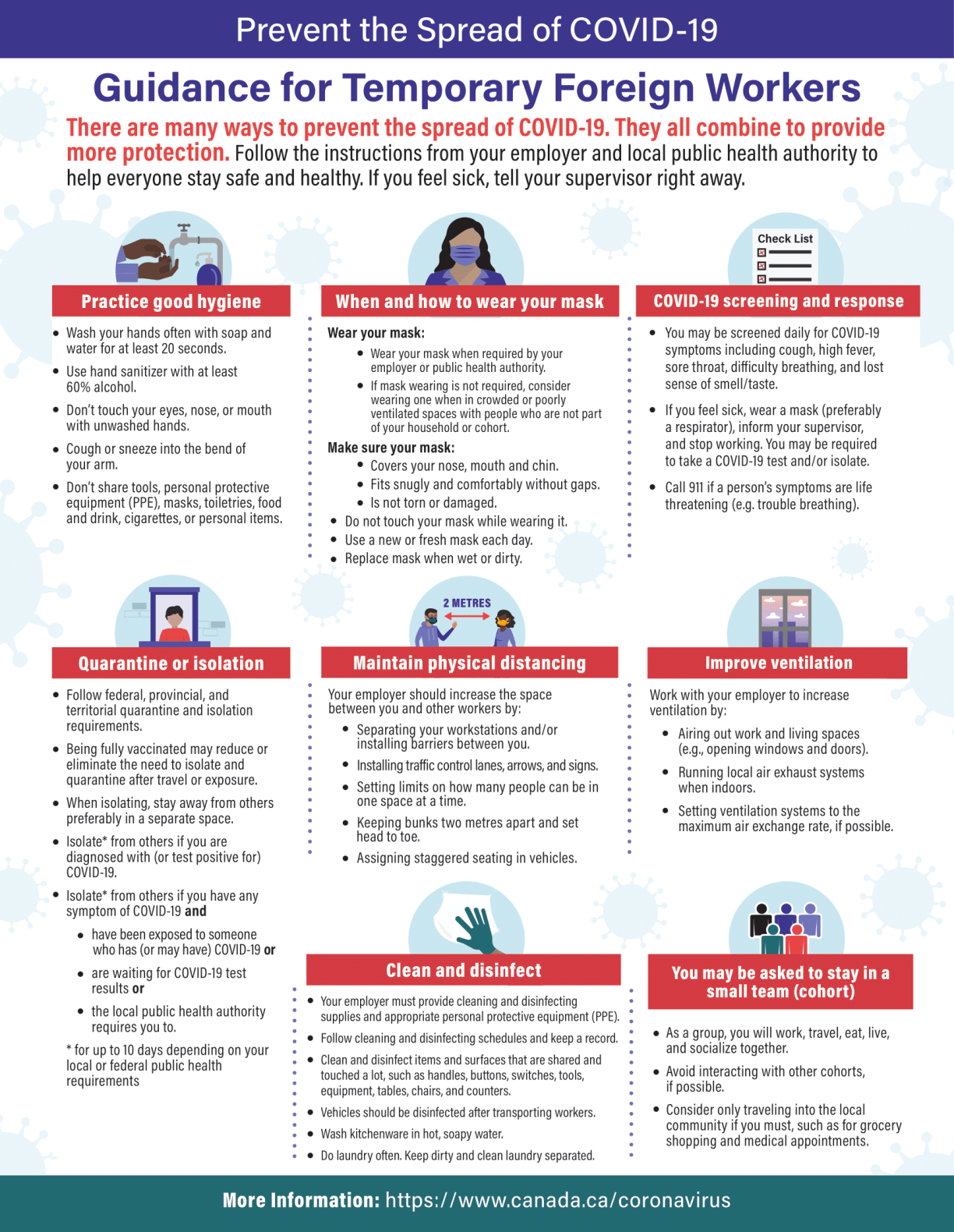Guidance for Temporary Foreign Workers Infographic and its text description
[PDF, 304 KB]

Description: COVID-19: Guidance for
Temporary Foreign Workers
There are many ways to prevent the spread of COVID-19. They all combine to provide more protection.
Follow the instructions from your employer and local public health authority to help everyone stay safe and healthy. If you feel sick, tell your supervisor right away.
Practice good hygiene
- Wash your hands often with soap and water for at least 20 seconds.
- Use hand sanitizer with at least 60% alcohol.
- Don't touch your eyes, nose, or mouth with unwashed hands.
- Cough or sneeze into the bend of your arm.
- Don't share tools, personal protective equipment (PPE), masks, toiletries, food and drink, cigarettes, or personal items.
When and how to wear your mask
- Wear your mask:
- Wear your mask when required by your employer or public health authority.
- If mask wearing is not required, consider wearing one when in crowded or poorly ventilated spaces with people who are not part of your household or cohort.
- Make sure your mask:
- Covers your nose, mouth, and chin.
- Fits snugly and comfortably without gaps.
- Is not torn or damaged.
- Do not touch your mask while wearing it.
- Use a new or fresh mask each day.
- Replace mask when wet or dirty.
COVID-19 screening and response
- You may be screened daily for COVID-19 symptoms including cough, high fever, sore throat, difficulty breathing, and lost sense of smell/taste.
- If you feel sick, wear a mask (preferably a respirator), inform your supervisor, and stop working. You may be required to take a COVID-19 test and/or isolate.
- Call 911 if a person's symptoms are life threatening (e.g. trouble breathing).
Quarantine or isolation
- Follow federal, provincial, and territorial quarantine and isolation requirements.
- Being fully vaccinated may reduce or eliminate the need to isolate and quarantine after travel or exposure.
- When isolating, stay away from others preferably in a separate space.
- Isolate* from others if you are diagnosed with (or test positive for) COVID-19.
- Isolate* from others if you have any symptom of COVID-19 and
- have been exposed to someone who has (or may have) COVID-19 or
- are waiting for COVID-19 test results or
- the local public health authority requires you to.
* for up to 10 days depending on your local or federal public health requirements
Maintain physical distancing
- Your employer should increase the space between you and other workers by:
- Separating your workstations and/or installing barriers between you.
- Installing traffic control lanes, arrows, and signs.
- Setting limits on how many people can be in one space at a time.
- Keeping bunks two metres apart and set head to toe.
- Assigning staggered seating in vehicles.
Improve ventilation
- Work with your employer to increase ventilation by:
- Airing out work and living spaces (e.g., opening windows and doors).
- Running local air exhaust systems when indoors.
- Setting ventilation systems to the maximum air exchange rate, if possible.
Clean and disinfect
- Your employer must provide cleaning and disinfecting supplies and appropriate personal protective equipment (PPE).
- Follow cleaning and disinfecting schedules and keep a record.
- Clean and disinfect items and surfaces that are shared and touched a lot, such as handles, buttons, switches, tools, equipment, tables, chairs, and counters.
- Vehicles should be disinfected after transporting workers.
- Wash kitchenware in hot, soapy water.
- Do laundry often. Keep dirty and clean laundry separated.
You may be asked to stay in a small team (cohort)
- As a group, you will work, travel, eat, live, and socialize together.
- Avoid interacting with other cohorts, if possible.
- Consider only traveling into the local community if you must, such as for grocery shopping and medical appointments.
For further information on COVID-19, refer to the Public Health
Agency of Canada
Document last updated on: 2022-04-21

